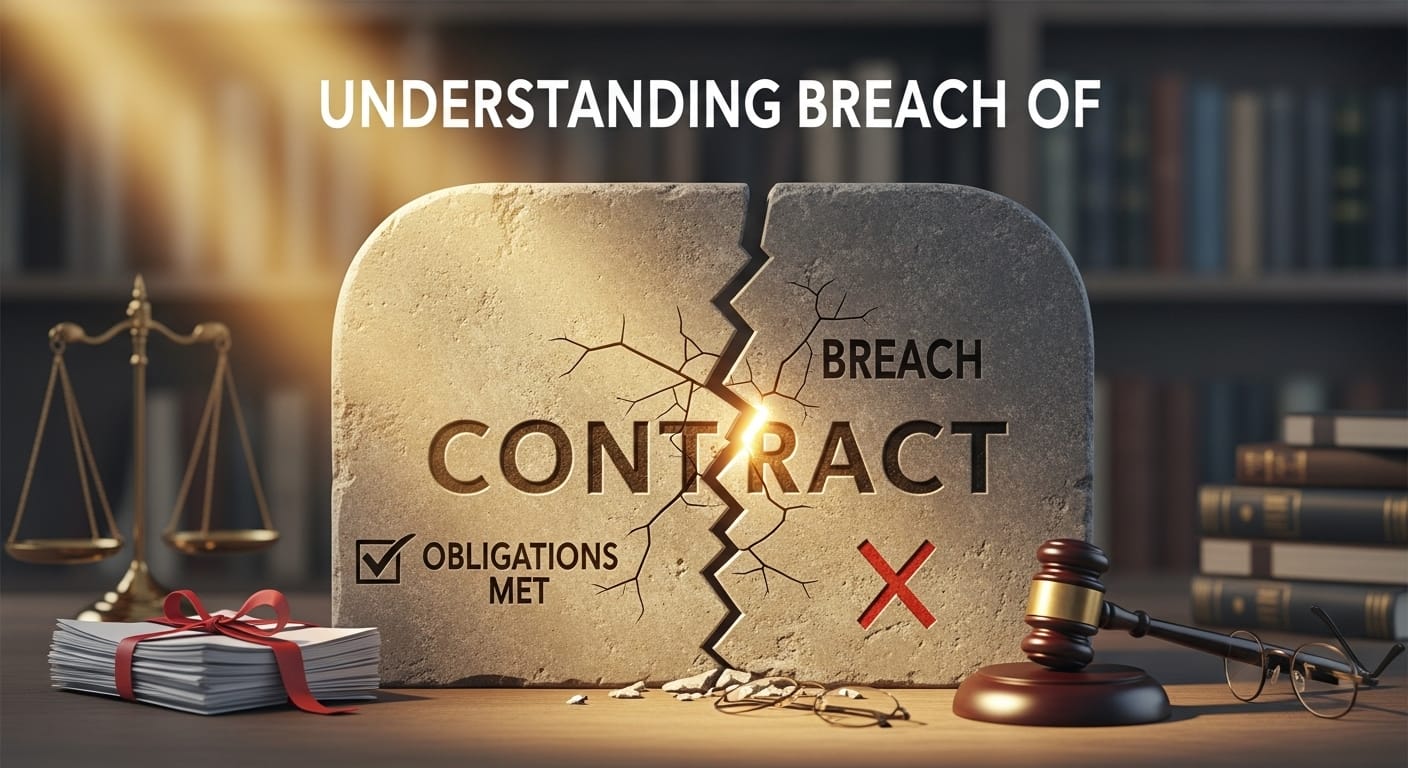Contracts are like the duct tape of the business world—they hold everything together, whether you’re agreeing to build a skyscraper, sell handmade scarves on Etsy, or rent your Aunt Mildred’s questionable lake cabin.
But what happens when someone decides, “Nah, I don’t feel like doing my part”? That’s when you’ve got yourself a breach of contract, which is both legally problematic and, let’s be honest, a little annoying.
To fully understand breaches of contract, we’ll dive into the different types, what they mean for your blood pressure (and your wallet), and how you can navigate these treacherous waters without losing your sanity—or your claim.

Top Takeaways and Key Concepts
Identify the breach type to determine your legal options and how serious the violation is.
Document all contract terms and communications to prove who failed to meet their obligations.
Communicate quickly with the other party to clarify misunderstandings and try resolving issues early.
Use legal remedies wisely by choosing damages, specific performance, or contract cancellation when appropriate.
Prevent future breaches with clear contract language, reliable partners, and consistent follow-up.
Summary of This Article
Please Note: This post may contain affiliate links. If you click one of them, we may receive a commission at no extra cost to you. As an Amazon Associate, I earn from qualifying purchases.
This article explains what a breach of contract is, why it happens, and how to deal with it. It defines a breach as a failure to meet agreed responsibilities and breaks down four main types: material, minor, anticipatory, and actual breaches. Common causes include miscommunication, lack of resources, financial issues, and bad faith. The article outlines legal consequences such as monetary damages, specific performance, or contract cancellation. It also gives practical advice to prevent breaches by writing clear agreements, vetting business partners, and maintaining communication. Finally, it offers steps to follow when a breach happens, from negotiating and mediation to filing a lawsuit if necessary.
1. What Is a Breach of Contract, Really?

A breach of contract occurs when one party in a legally binding agreement decides to play fast and loose with their obligations. Imagine signing a deal to cater a wedding, only to show up with cold pizza instead of the five-course meal you promised. Spoiler alert: that’s a breach.
Contracts are supposed to be clear about who does what, when, and how. If someone skips out on their responsibilities—whether intentionally or accidentally—they’re in breach. This can range from minor hiccups (showing up late with the cupcakes) to massive disasters (not showing up at all).
Interestingly enough, not all breaches are treated the same. The courts like to divide them into categories because, of course, even legal jargon loves subcategories.
2. Types of Breaches: It’s Not One-Size-Fits-All
To be fair, not every breach will have you suing for millions of dollars. Some are minor, while others are like a legal hurricane. Here are the main types:
Material Breach
This is the big one—the breach equivalent of setting the contract on fire and dancing on the ashes. A material breach happens when one party fails to fulfill a major part of the agreement, rendering the whole deal pointless.
Imagine hiring a contractor to build a house, only for them to deliver a treehouse. You’d probably call your lawyer faster than you could say, “Where’s my roof?”
Minor (or Partial) Breach
Think of this as a speed bump rather than a complete roadblock. A minor breach doesn’t ruin the whole contract, but it still causes some issues.
For example, if your wedding DJ shows up but forgets the fog machine you specifically requested for your dramatic entrance, you’ve got yourself a minor breach. Annoying? Sure. Worth suing over? Maybe not.
Anticipatory Breach
Here’s where things get a little psychic. An anticipatory breach occurs when one party essentially says, “Hey, I’m not going to fulfill my end of the deal.”
They haven’t failed yet, but they’re making it clear they plan to. It’s like your caterer calling the day before the wedding to say, “Yeah, I’m not doing this.” Fun, right?
Actual Breach
This one’s straightforward. It’s when someone just flat-out fails to perform. You paid for the services, the deadline passed, and… nothing. Not a peep. Not an email. Just the deafening silence of a broken agreement.
3. Common Causes of Breaches: Why Do People Flake?
Honestly, breaches happen for all kinds of reasons. Sometimes people are lazy, sometimes they’re overwhelmed, and sometimes they’re just plain shady. But let’s break it down:
– Lack of Resources: Businesses bite off more than they can chew. A supplier who promised you 500 t-shirts might realize they don’t even own a printer.
– Miscommunication: Contracts written in vague or confusing terms are like ticking time bombs. If both parties interpret the agreement differently, it’s only a matter of time before someone’s yelling, “That’s not what we agreed on!”
– Financial Trouble: If a party goes bankrupt, well, good luck getting them to honor the deal. You can’t get water from a stone—or cash from a broke company.
– Bad Faith: This is when someone deliberately tries to wriggle out of their responsibilities. They know what they’re doing, and spoiler alert: the courts don’t love it.
4. The Consequences of a Breach: Spoiler Alert—They’re Not Great
Let’s see, what happens when someone breaches a contract? Aside from the inevitable headache, there are legal remedies to consider. The consequences depend on the type and severity of the breach.
Monetary Damages
Money fixes everything, right? Well, maybe not *everything*, but it’s a start. Courts can award damages to cover your losses. These can include:
– Compensatory Damages: To cover what you’ve lost because of the breach.
– Punitive Damages: To punish the breaching party (and scare others into playing fair).
– Nominal Damages: For when you’re technically right but didn’t suffer much actual harm.
Specific Performance
Sometimes money isn’t enough. If the breach involves something unique—like a one-of-a-kind painting or the sale of a rare property—the court might order the breaching party to fulfill their end of the deal.
Cancellation and Restitution
In some cases, the best option is to scrap the contract altogether. You walk away, get your money back, and vow to never trust anyone again. (Okay, maybe that last part is optional.)
5. How to Avoid Breaches: It’s Easier Than You Think
Let’s be real: no one wants to end up in court. So, how can you avoid breaches in the first place?
– Write Clear Contracts: Use specific terms and avoid ambiguous language. “Delivery by June 1” is much clearer than “sometime in June.”
– Communicate Regularly: Check in with the other party throughout the process. A quick email can save you from a world of trouble.
– Vet Your Partners: Before signing on the dotted line, do your homework. Make sure the other party is reputable and capable of fulfilling their obligations.
6. What to Do If a Breach Occurs: Don’t Panic, But Do Act
First things first: document everything. Save emails, take notes, and keep copies of the contract. Then, consider your options:
– Negotiate: Sometimes a polite conversation can resolve the issue without lawyers or courtrooms.
– Mediation or Arbitration: These are less formal (and less expensive) alternatives to litigation.
– Sue: If all else fails, take it to court. Just make sure the breach is worth the time and cost of a lawsuit.
Conclusion: Breaches Are Annoying, But Manageable
A breach of contract might feel like the end of the world, but with a little preparation and the right legal advice, you can navigate it like a pro. Just remember: clear contracts and good communication are your best defenses against the chaos of broken promises.
Suggested Resources:
– Common Breach of Contract Defenses
https://www.nolo.com/breach-of-contract-defenses
– How to Write an Enforceable Contract
https://www.lawdepot.com/contract-writing-tips
– Types of Breaches Explained
https://www.upcounsel.com/types-of-breaches
Frequently Asked Questions
What is a breach of contract?
A breach of contract happens when one party fails to fulfill their agreed obligations. It can be intentional, accidental, minor, or serious, depending on the situation.
What are the main types of contract breaches?
The four main types are material, minor, anticipatory, and actual breaches. Each varies in severity and determines the legal remedies available.
What causes a breach of contract?
Common causes include miscommunication, lack of resources, financial problems, or bad faith. Poorly written contracts also increase the risk of disputes.
What legal remedies are available for a breach?
Remedies may include monetary damages, specific performance, or contract cancellation and restitution, depending on the nature of the breach and court decision.
How can I prevent a breach of contract?
Use clear contract language, choose trustworthy partners, and maintain regular communication throughout the agreement to ensure expectations are met.
What should I do if the other party breaches the contract?
Document everything, attempt to negotiate, and consider mediation or arbitration. If unresolved, you may need to pursue a lawsuit for compensation or enforcement.
When should I consult a lawyer about a breach?
If the breach involves major losses, complex terms, or repeated violations, consulting a contract attorney can help you assess your rights and possible legal actions.

Kevin Collier is a legal expert passionate about simplifying complex legal concepts for everyday individuals. With a focus on providing clear, practical information, he covers a wide range of topics, including rights, responsibilities, and legal procedures. Kevin aims to empower readers with the knowledge they need to navigate the legal landscape confidently, ensuring they can make informed decisions regarding their legal matters. Through insightful articles and easy-to-understand resources, he helps demystify the law, making it accessible to all.










